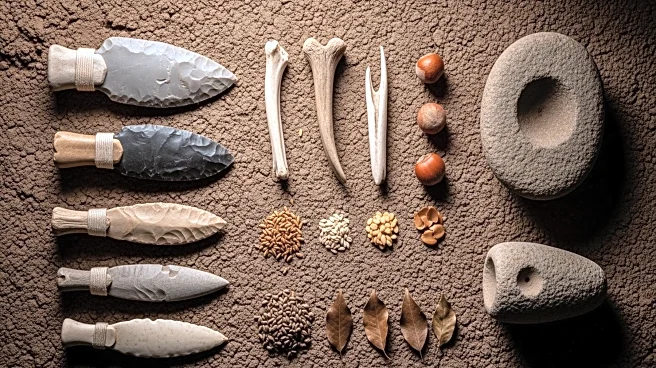What's Happening?
Recent research has revealed that Neanderthals, often characterized as primarily meat-eaters, had a more varied diet that included plant-based foods. Studies have shown that Neanderthals consumed a range
of plant foods such as pistachios, lentils, and wild peas, alongside their meat-heavy diet. Evidence from isotopic analysis of Neanderthal remains indicates that while they were top-level carnivores, they also adapted their diets based on regional availability and seasonal changes. Archaeological findings from sites like El Sidrón Cave in Spain and El Salt in Alicante have uncovered plant residues in dental plaque and fossilized feces, suggesting that Neanderthals consumed plants like yarrow and chamomile, possibly for medicinal purposes. This challenges the traditional view of Neanderthals as exclusively meat-eaters and highlights their dietary adaptability.
Why It's Important?
Understanding the dietary habits of Neanderthals provides valuable insights into human evolution and adaptability. The evidence of plant consumption suggests that Neanderthals were capable of dietary flexibility, which may have contributed to their survival in various environments. This adaptability is significant as it parallels the dietary strategies of modern humans, who also rely on a mix of animal and plant-based foods for nutrition. The findings could influence current perspectives on human dietary evolution and the role of plant-based nutrition in health and survival. Additionally, this research may impact the study of ancient human societies and their interactions with the environment, offering a broader understanding of how early humans adapted to changing climates and food availability.
What's Next?
Further research is likely to explore the extent of plant consumption among Neanderthals and its implications for their health and survival. Scientists may conduct more detailed isotopic analyses and archaeological excavations to uncover additional evidence of plant-based diets. These studies could lead to a reevaluation of Neanderthal dietary habits and their ecological impact. Additionally, researchers might investigate the cultural and social aspects of Neanderthal food preparation and consumption, providing deeper insights into their daily lives and survival strategies. The findings could also inspire comparative studies with other hominin species to understand the evolution of dietary practices across different human ancestors.
Beyond the Headlines
The discovery of plant consumption by Neanderthals raises questions about their cognitive abilities and cultural practices. The use of plants for medicinal purposes suggests a level of knowledge and understanding of their environment. This could imply that Neanderthals had complex social structures and shared knowledge about food and medicine. The findings also challenge stereotypes about Neanderthals as primitive and unsophisticated, highlighting their ability to adapt and innovate. This research may contribute to a broader reevaluation of Neanderthal intelligence and their role in human evolution, potentially altering perceptions of their capabilities and contributions to the development of human societies.











